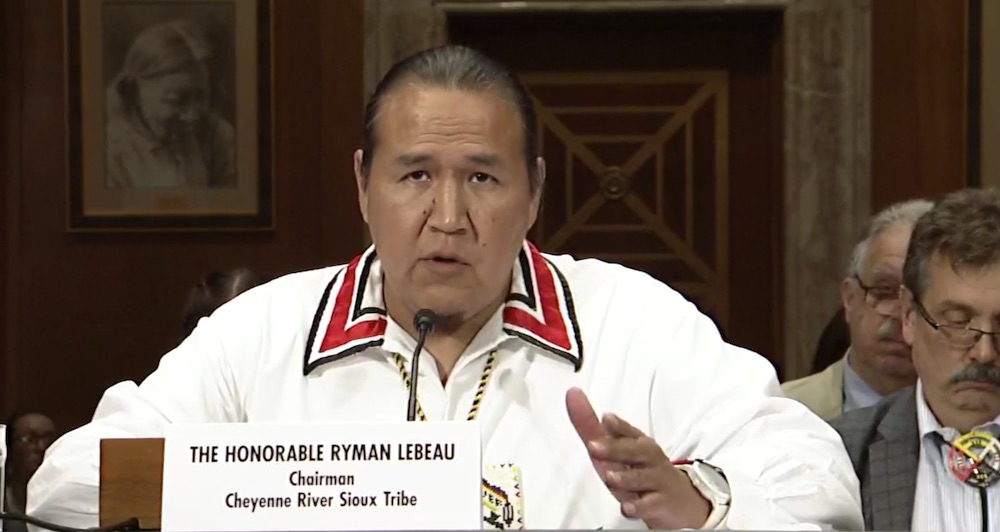
- Details
- By Tribal Business News Staff
- Policy and Law
WASHINGTON – The Senate Committee on Indian Affairs (SCIA) has advanced eight pieces of bipartisan legislation aimed at addressing a variety of issues in Indian Country, including Native homeownership, tribal self-determination and economic development opportunities for tribes.
At a business meeting last week, the SCIA passed the following bills:
- S. 195, the Keweenaw Bay Indian Community Land Claim Settlement Act of 2023;
- S. 382, the Puyallup Tribe of Indians Land into Trust Confirmation Act of 2023;
- S. 910, a bill to amend the Grand Ronde Reservation Act, and for other purposes;
- S. 1286, a bill to amend the Siletz Reservation Act to address the hunting, fishing, trapping, and animal gathering activities of the Confederated Tribes of Siletz Indians, and for other purposes;
- S. 1322, the UNLOCKED Act;
- S. 1987, the Fort Belknap Indian Community Water Rights Settlement Act of 2023;
- S. 2273, a bill to amend the Indian Child Protection and Family Violence Prevention Act; and
- S. 2285, a bill to reauthorize the Native American Housing Assistance and Self-Determination Act (NAHASDA) of 1996.
“These Committee-passed bills unlock opportunities for tribal economic development, protect Native children and families, help Native communities deliver housing for their members, and work to fulfill the United States’ trust and treaty obligations,” Sen. Brian Schatz (D-HI), chairman of the SCIA said in a statement.
The legislation will help simplify the complexities of tribal homeownership, further tribal self-determination, increase economic development opportunities in Native communities, and complete the last remaining tribal water rights settlement in Montana, according to Sen. Lisa Murkowski (R-AK), vice chair of the SCIA.
While many of the bills that advanced are related to a specific tribe, the passage of S. 2285 to reauthorize and strengthen NAHASDA would address an issue that affects many, if not most, tribal nations: affordable housing. With funding for native housing stagnated for years, NAHASDA represents a powerful solution for many of Indian Country’s housing issues, including overcrowding, homelessness and insufficient affordable housing, according to a tribal housing advocate who spoke at a Senate hearing last month.
With their passage out of committee, the bills will move to the full Senate for consideration.
“I am hopeful we can move these bills through the Senate and House this year and see them signed into law by the President,” Murkowski said in a statement.
Following the business meeting, the SCIA held a legislative hearing on a bill that would set forth a tribal-led approach to honor the unarmed Lakota men, women, and children killed by the U.S. Army in the 1890 Wounded Knee Massacre. The proposed Wounded Knee Massacre Memorial and Sacred Site Act, sponsored by South Dakota Republican Sens. Mike Rounds and John Thune, would allow for the land to be held in restricted fee status by the Oglala Sioux Tribe and Cheyenne River Sioux Tribe.
The committee heard testimony from Principal Deputy Assistant Secretary – Indian Affairs Wizipan Garriott from the Department of the Interior, Chairman of the Cheyenne River Sioux Tribe Ryman Lebeau, and President of the Oglala Sioux Tribe Frank Star Comes Out.
The Wounded Knee land will be used for sacred purposes and remembrance, including ceremonies and prayer, according to Star Comes Out’s testimony. The descendants of victims and survivors of the Wounded Knee Massacre will be consulted about the proper care and maintenance of the land as a memorial and sacred site and about the ceremonies and activities to be conducted on the land.
“Our people have grieved for well over a century the loss of life and the genocidal attack on our people and our way of life that took place at Wounded Knee,” Star Comes Out said. “The Oglala Sioux Tribe has called upon the United States to atone for the massacre, and our calls for atonement have been echoed by the Wounded Knee Survivors Association, the National Congress of American Indians, our sister Sioux Tribes, and many other Tribes and organizations.”
If passed, the legislation will ensure that the sacred lands of the Wounded Knee Massacre will be “forever protected” by the two tribes, Murkowski said in a statement.
“Memorializing this land in no way absolves the U.S. Army of its actions in one of the deadliest massacres in our nation’s history, but it is an important step in honoring those who were lost on that dark day and promoting healing for their descendants.”
